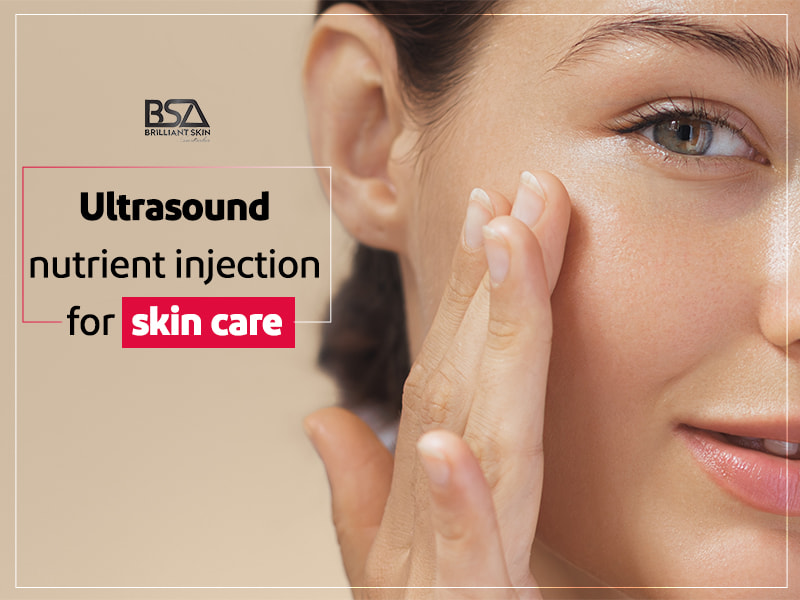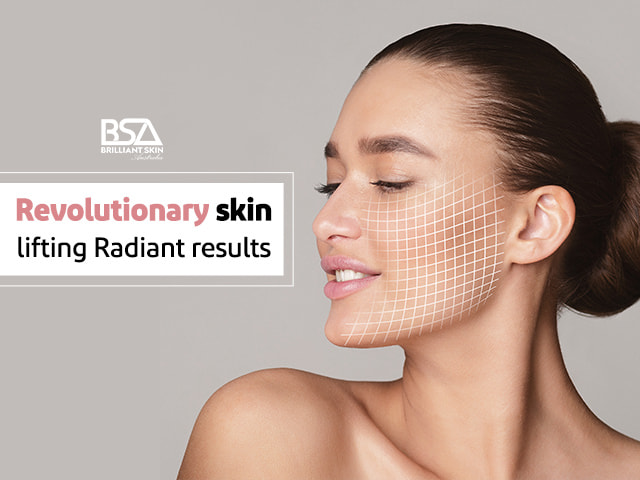What Is Collagen? How to Stimulate Collagen Production
- Updated June 30, 2022
- by Honey Seida
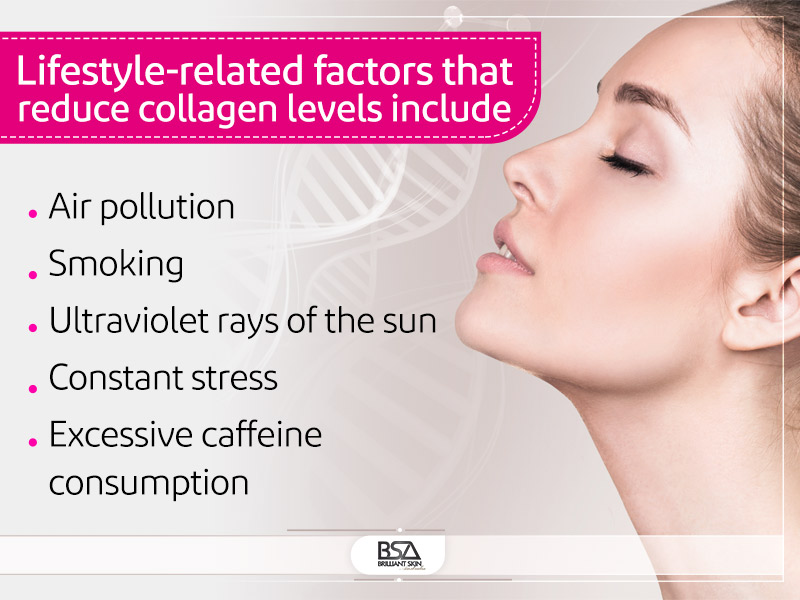
Everyone wants to have healthy, young, fresh, and wrinkle-free skin. As you grow older, your body produces less collagen. Collagen is a protein that is involved in creating elasticity and cohesion in the skin. Over time with reduced collagen production in the skin, a number of wrinkles and unpleasant lines will appear. Collagen makes skin look healthy and supple.
As you age and the production of collagen slows down, however, the skin will begin to wrinkle. Various treatments, skin care products, and certain foods as well as healthy lifestyle choices can help to stimulate collagen production and rejuvenate the skin.
What Is Collagen?
Collagen is a long, fibrous protein found in the skin, tendons, bones, blood vessels, muscles, eyes, and even teeth. To better understand it, you can think of collagen as a cable-like or adhesive-like protein that is responsible for stabilizing connective tissue.
The appearance and liveliness of the skin depends on the presence of collagen to maintain the required strength, consistency, elasticity, and moisture. Because collagen plays a key role in caring for the outermost layer of the skin, known as the skin's protective tissue, high levels of collagen production can certainly help the skin to do its job properly and prevent the absorption of dangerous toxins, pathogens, or other unwanted compounds.
What Causes Collagen to Break Down?
Numerous factors play a role in lowering collagen levels, such as raising blood sugar levels that will increase the likelihood of the formation of collagen-destroying compounds. Try to reduce the consumption of sugary foods and follow a healthy lifestyle.
Recent research has shown the constructive effects of collagen on protecting the skin and maintaining its health.
Toxins from certain foods, air, water, and even internal toxins such as bad bacteria in the gastrointestinal tract can enter the bloodstream and eventually reach the skin and cause damage. When these toxins in the blood get to the skin, they can trigger an immune system reaction, releasing collagen-depleting compounds into the cells of the immune system.
External factors that damage collagen include exposure to the sun's ultraviolet rays, environmental pollutants, and some microorganisms that damage the skin. To protect the skin against these external factors, topical antioxidants such as vitamins E and C, air purifiers and appropriate sunscreen should be used.
Fortunately, research has shown that consuming certain nutrients, in addition to preventing collagen levels from falling, plays a significant role in protecting the collagen and consequently the skin.
How to Stimulate Collagen Production
Observing the points mentioned in this section and making positive lifestyle changes will have considerable effects on the production of collagen by the skin and maintaining its flexibility and elasticity.
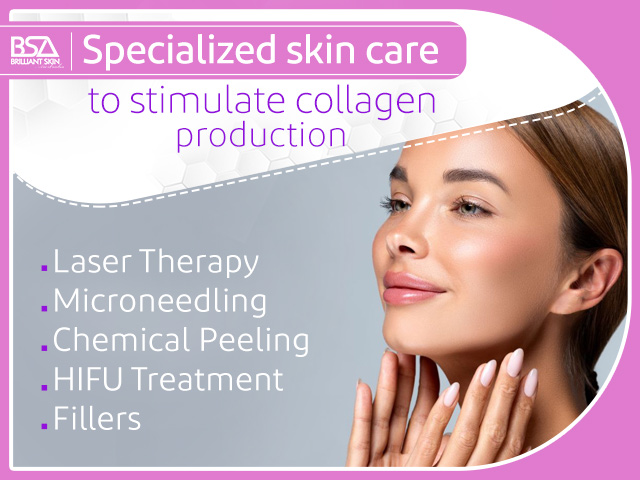
Lifestyle Changes
Each person's specific lifestyle has a profound effect on the health of their skin. Lifestyle-related factors that reduce collagen levels include:
- Air pollution
- Smoking
- Ultraviolet rays of the sun
- Constant stress
- Excessive caffeine consumption
These factors cause the production of free radicals in the skin and the destruction of collagen fibers, as a result of which collagen begins to break down and the skin will appear wrinkled and loose.
In adolescence, the body fights these factors and regularly produces collagen to make the skin look healthy and young, but in middle-aged people, collagen stores will begin to deplete due to a decrease in the activity of collagen-producing cells.
Doing repetitive movements such as frowning will cause lines and wrinkles on the face to form, and since the skin lacks the ability to produce collagen and fill in these lines, the wrinkles will become permanent.
Fortunately, lifestyle changes can stimulate the skin to produce collagen for a long time. For example, you can easily help to improve your skin health by stopping having coffee early in the morning.
Diet
When you eat protein, your body converts it to amino acids, which will allow the body to absorb the nutrients it needs, such as omega-3 fatty acids and vitamin A. In order to get these nutrients to your body, you need to consume the following foods:
- Tuna
- Salmon
- Sardine
- Mackerel
- Herring
- Chia seeds
- Flax seeds
- Walnut
- Liver
- Cod liver oil
These proteins can help the body to produce more collagen. You can also add antioxidant-rich vegetables and fruit to your diet to prevent collagen depletion. Some fruit and vegetables that are involved in increasing collagen production are:
- Bell pepper
- Berries such as blackberries, blueberries, raspberries
- Tropical fruit such as mango, pineapple, kiwi, and guava
- Beans
- Green leafy vegetables such as spinach, beets, and kale
- Citrus fruit such as lemon, lime, orange, and grapefruit
Avoiding certain foods will help improve skin health and stimulate collagen production. For example, you should be careful about the amount of carbohydrates and sugars in your diet, as these foods can cause inflammation and damage to the skin's collagen.
Instead, try vegetables and fruit that are high in minerals, as well as protein-rich plants and animal foods.
Other nutrients that can help to increase the levels of collagen production by skin cells include vitamin C, copper, and zinc.
Sunscreen
Excessive exposure to the sun's ultraviolet rays will damage the skin and reduce collagen production. Collagen-degrading enzymes will be activated if you are exposed to more than two hours of sunlight.
Regular use of sunscreen helps to protect your skin and prevent collagen loss. It is better to use sunscreen with a protection grade of 30 or higher. If you sweat a lot or leave the house for more than a few hours, you should reapply your sunscreen at regular intervals.
Collagen-Producing Compounds
The skin needs antioxidants to reduce inflammation and neutralize dangerous free radicals. Antioxidants protect the collagen in the skin and increase its production by skin cells. You can use collagen-building ingredients to improve the quality of your skin.
Vitamin A Derivatives
Some skin hydrating products, such as vitamin A derivatives, stimulate the production of collagen. Consumption of products containing retinol and retinoic acid forces the body's cells to produce more collagen. These compounds will also help maintain the collagen in the skin.
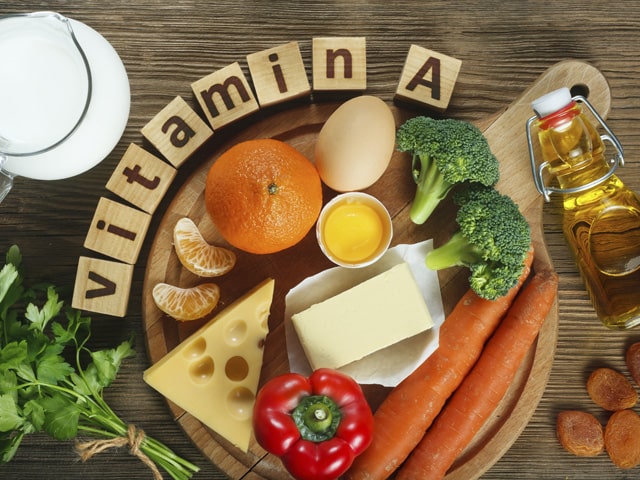
In some people, though these compounds may cause skin inflammation. If you use retinol-containing products, make sure to apply only about the size of a pea to your skin.
Aloe Vera Gel
Many people use aloe vera gel to improve their skin after sunburn. The use of this gel is also beneficial for improving skin rashes. You can also take aloe vera gel orally.
- Some of the properties of aloe vera are as follows:
- Stimulation of the growth process of specific cells
- Increasing the production of collagen and hyaluronic acid
- Reducing wrinkles and facial lines
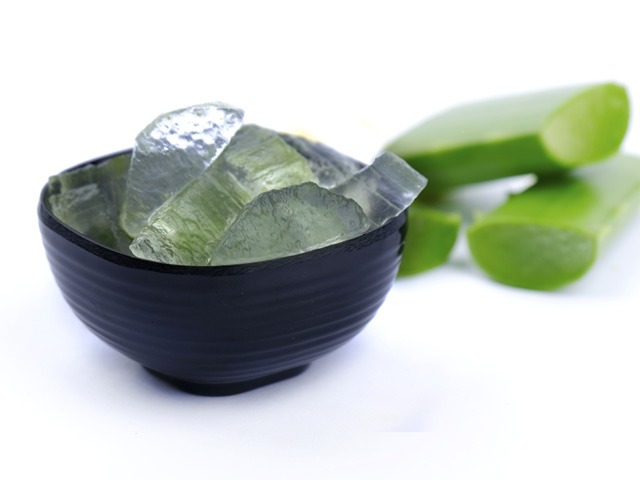
Aloe vera gel can also be used as a topical cream or an oral supplement.
Vitamin C
Our bodies cannot produce vitamin C on their own, so it must be supplied through a variety of green leafy fruit and vegetables. This vitamin plays a vital role in protecting the skin and producing more collagen. By adding vitamin C to your diet, you can protect the existing collagen and force the body to increase its production. Many skin care products contain this vitamin.
Here are some sources that are rich in vitamin C:
- Broccoli
- Strawberry
- Papaya
- Citrus fruit such as oranges, lemons, and grapefruits
- Green leafy vegetables such as kale and spinach
If this vitamin has no place in your diet, it would be a good idea to think about modifying your diet as soon as possible and providing your body with the vitamin C that it needs.
Hyaluronic Acid
According to research, hyaluronic acid will stimulate the production of natural collagen by the body. Hyaluronic acid as an important compound for collagen production will help increase skin elasticity. Although hyaluronic acid is available as a supplement, you can get it through the consumption of some amino acid-rich foods too. Some of these foods include legumes, soy, and root vegetables.
Peptides and Growth Factors
Peptides are messengers in the body that instruct the cells to increase collagen production. On the other hand, growth factors stimulate the body's stem cells and fibroblasts, which in turn process the production of collagen and new cells.
Peptides and growth factors are less likely to cause skin inflammation than vitamin A. However, you will have to use these products for a longer period of time to see results. You should use retinoids at night and take peptides and growth factors early in the morning to balance your skin care program.
Antioxidants
Antioxidants protect the body against free radicals that damage the skin and the body itself. Although not all antioxidants increase the levels of collagen production, some of them protect the collagen in the skin. Some of the sources that are rich in antioxidants are as follows:
- Green tea
- Cinnamon
- Blueberry
- Coffee extract
- Licorice extract
- Essential oils of basil, oregano, and thyme
- Pomegranate extract
Retinol is also an antioxidant that will stimulate collagen production in the body. In addition to prolonging the life of collagen, retinol inhibits the activity of enzymes that break down collagen. In other words, retinol is essential for maintaining collagen in the skin and increasing its production process.
Changing Skin Care Products
Once you are familiar with the essential ingredients your body and skin need, you should add them to your daily skin care routine. The products you use must contain the following ingredients:
- DNA repair enzymes
- Peptides
- Antioxidants
Instead of looking for products that promise to produce collagen, it is a safer practice to choose the ones containing the compounds mentioned above in order to stimulate collagen production. Use products that help compensate for collagen loss without damaging the skin.
Specialized Skin Care and Collagen Production
There are several specialized treatments available for skin performed with the aim of stimulating collagen production. Methods such as chemical peels and laser treatment, ultrasound therapy, and radiofrequency help to produce collagen in the skin.
Microneedling and injection of platelet-rich plasma will also stimulate skin collagen production.
Read more: Popular Anti Aging Treatments Methods
Laser Therapy
Laser treatment is a method that safely increases the levels of collagen production. This treatment will take care of facial wrinkles and skin elasticity by increasing collagen.
Microneedling
Microneedling helps to improve the appearance of facial wrinkles, and acne scar tissues, increase skin firmness, and remove brown spots, and this process will be done by stimulating the body to repair itself.
Microneedling is a device that has a number of very small and sharp needles in the head that will make hundreds of small holes in the skin at the same time. In this way, it stimulates the skin to produce more growth factors, cytokines, collagen, and elastin. As a result, the skin will look younger.
Microneedling is used to treat fine lines, pimples, and scars, cause firmness and improve skin tone. During the procedure, a micro pen or roller is used to create controlled wounds on the skin surface and produce collagen and elastin.
Chemical Peeling
During this treatment, acid will be used to remove the top layer of the skin. The purpose of this treatment is to reduce wrinkles and fine lines on the face and even out the skin. Chemical peels are also used to improve pimples, treat certain types of acne, reduce age spots, dark skin lines, and the like.
HIFU Treatment
HIFU Treatment or High-Intensity Focused Ultrasound is a new method for skin rejuvenation by ultrasound, which without surgery, in addition to removing wrinkles, will also cause skin lifting.
In HIFU therapy, high-frequency ultrasound rays are focused on an area of the skin and help to increase collagen production by stimulating the underlying layers of the skin.
Injection of Fillers
Therapists often use fillers to remove wrinkles and increase volume in different parts of the face and body, which can be fat extracted from the body, or made of gel-like substances that in addition to increasing volume and shaping and removing lines will also lead to more collagen production in the body.
It should be noted that fat injections if performed properly and by an experienced and skilled practitioner, can lead to desirable long-term results (ideal shape and volume and skin rejuvenation due to increased collagen production).



